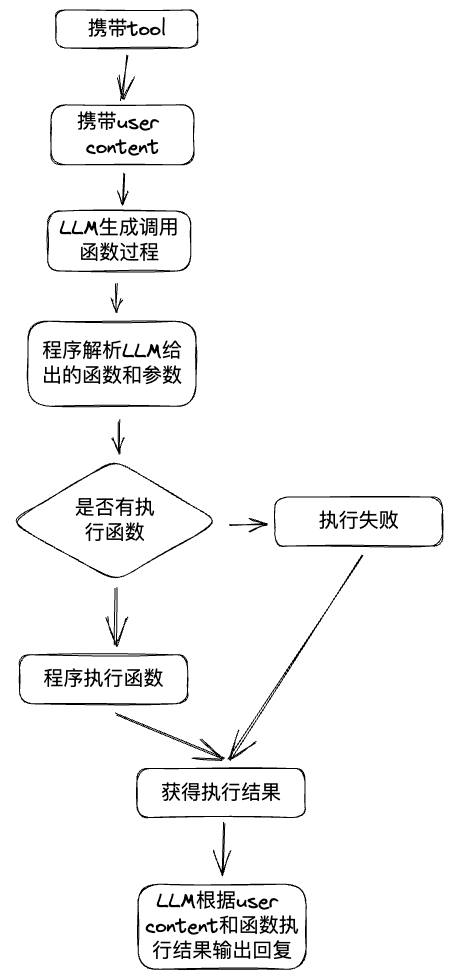在任意LLM模型中实现function calling
OpenAI之前给自己的新模型提供了function calling的能力具体的内容可查看官方的Doc,暨在给LLM提供tools工具的情况下,他能根据与你的对话内容自主选择函数。
OpenAI的Function calling
tools=[
{
"type": "function",
"function": {
"name": "get_current_temperature",
"description": "Get the current temperature for a specific location",
"parameters": {
"type": "object",
"properties": {
"location": {
"type": "string",
"description": "The city and state, e.g., San Francisco, CA"
},
"unit": {
"type": "string",
"enum": ["Celsius", "Fahrenheit"],
"description": "The temperature unit to use. Infer this from the user's location."
}
},
"required": ["location", "unit"]
}
}
}
]OpenAI的接口中出现了一个新的参数tools,将可以让LLM调用的的函数注册到这个参数中。
{
"id": "run_qJL1kI9xxWlfE0z1yfL0fGg9",
...
"status": "requires_action",
"required_action": {
"submit_tool_outputs": {
"tool_calls": [
{
"id": "call_FthC9qRpsL5kBpwwyw6c7j4k",
"function": {
"arguments": "{"location": "San Francisco, CA"}",
"name": "get_rain_probability"
},
"type": "function"
}
...
"type": "submit_tool_outputs"
}
}貌似如果入参携带了tools参数,那么就一定会返回如上调用结构,而不是正常的Chat模式,再根据返回的数据调用函数获得函数结果后再喂给LLM,LLM再结合函数结果和用户content回复用户。
整个过程的流程图如下:

function calling流程
说的那么好,那么哪里才能搞到OpenAI的API呢。
虽然官方的路子可能不太好搞,但是野路子多的是,不在这次的讨论范围内。现在要考虑如何不使用OpenAI接口的情况下实现function calling。目前市面上各种开源不开源的各种LLM都有各自的特色,况且百度的基础LLM都免费可以用了。
实现通用的Function calling
本次的目标就是期望能够在不需要OpenAI API的情况下,任意的LLM后端,如LLama.cpp、Ollama或者其他的后端都能实现Function calling功能,只需要Text Generate就能使用这个功能。
Function calling原理
在刚开始看到function calling的时候确实是以为又出现了什么新的模型,但这个功能确实用处很大,在比起单纯的文本生成或者后面新出的RAG来说信息的准确性和其他系统的交能力肯定有质的提升。
于是某一天在搜索Ollama有没有function call的时候在langchain中发现了一点思路 ollama_functions.ts
神奇的赛博咒语
Ollama官方并没有function calling的功能,但是langchain却实现了,原理就是使用了一段prompt
You have access to the following tools:
{tools}
You must always select one of the above tools and respond with only a JSON object matching the following schema:
{{
"tool": <name of the selected tool>,
"tool_input": <parameters for the selected tool, matching the tool's JSON schema>
}}为了兼容OpenAI function的结构也是一样的
protected defaultResponseFunction = {
name: "__conversational_response",
description:
"Respond conversationally if no other tools should be called for a given query.",
parameters: {
type: "object",
properties: {
response: {
type: "string",
description: "Conversational response to the user.",
},
},
required: ["response"],
},
};看到这醍醐灌顶,这解决方法真是简单粗暴,不需要新的模型,也不需要fine tune,只需要设置这段system prompt只要LLM的逻辑能力够强就能直接让他根据你提供的内容输出指定的json格式,然后解析json并处理函数就可以了。
灵活性甚至比OpenAI的还要高,因为OpenAI一旦启用function calling功能就只能输出submit_tool_outputs无法正常回答问题,需要将运行结果和content再次输入模型获得新的结果,也就是说即使用户提问与任何tool都无关,还是需要执行整套流程,如上面流程图所画。
只要小小的修改一下prompt,就能在用户的内容与tools无关的情况下直接返回信息,而不需要再次输入模型。这样就能既节省时间又省钱。
You have access to the following tools:
{tools}
You can select one of the above tools or just response user's content and respond with only a JSON object matching the following schema:
{{
"tool": <name of the selected tool>,
"tool_input": <parameters for the selected tool, matching the tool's JSON schema>,
"message": <direct response users content>
}}这样的prompt就能在用户提问与tools都不相关的情况直接回答用户问题。
如果LLM逻辑能力够强是能直接返回json数据,我们只需要解析json并执行函数就可以了。
{
"tool":"tool",
"tool_input":{
"arg1":"arg1",
"arg2":false
},
"message":"LLM message"
}执行函数也不用详细说了,只需要类似如下的函数表来执行函数,动态语言的话是很容易做到的。
def getWeather(arg):
pass
def getTemperature(arg):
pass
functions = {
"getWeather":getWeather,
"getTemperature":getTemperature
}可行性测试
我自己写了一个Demo,在本地使用llama3、百度免费的ERNIE Speed和阿里通义都能理解prompt并返回正确的json。
其他的LLM没有试过,毕竟其他的在线大模型都还是收费的。
但是均有一点小问题:
- llama3不知道为什么偶尔会将函数名内添加空格,导致执行函数失败,但是问题不大执行前去空格就行。
- 百度ERNIE Speed返回的内容不只是json,他返回的类似
好的,这是您需要的json格式内容:<json内容>,所以需要先提取json再处理。